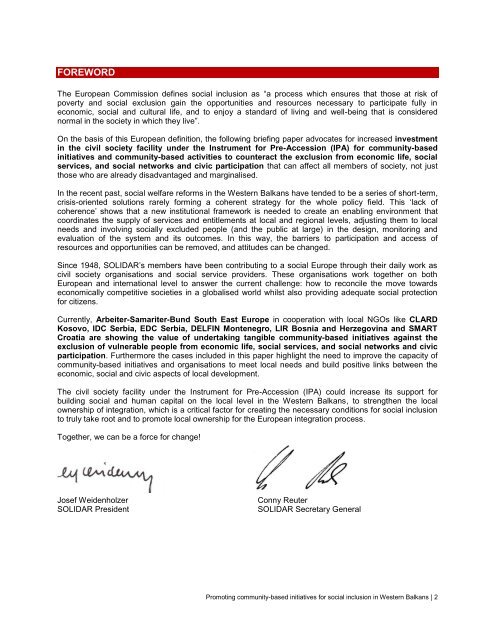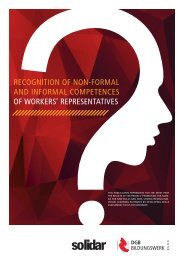Promoting community-based initiatives for social inclusion ... - Solidar
Promoting community-based initiatives for social inclusion ... - Solidar
Promoting community-based initiatives for social inclusion ... - Solidar
Create successful ePaper yourself
Turn your PDF publications into a flip-book with our unique Google optimized e-Paper software.
FOREWORD<br />
The European Commission defines <strong>social</strong> <strong>inclusion</strong> as “a process which ensures that those at risk of<br />
poverty and <strong>social</strong> exclusion gain the opportunities and resources necessary to participate fully in<br />
economic, <strong>social</strong> and cultural life, and to enjoy a standard of living and well-being that is considered<br />
normal in the society in which they live”.<br />
On the basis of this European definition, the following briefing paper advocates <strong>for</strong> increased investment<br />
in the civil society facility under the Instrument <strong>for</strong> Pre-Accession (IPA) <strong>for</strong> <strong>community</strong>-<strong>based</strong><br />
<strong>initiatives</strong> and <strong>community</strong>-<strong>based</strong> activities to counteract the exclusion from economic life, <strong>social</strong><br />
services, and <strong>social</strong> networks and civic participation that can affect all members of society, not just<br />
those who are already disadvantaged and marginalised.<br />
In the recent past, <strong>social</strong> welfare re<strong>for</strong>ms in the Western Balkans have tended to be a series of short-term,<br />
crisis-oriented solutions rarely <strong>for</strong>ming a coherent strategy <strong>for</strong> the whole policy field. This „lack of<br />
coherence‟ shows that a new institutional framework is needed to create an enabling environment that<br />
coordinates the supply of services and entitlements at local and regional levels, adjusting them to local<br />
needs and involving <strong>social</strong>ly excluded people (and the public at large) in the design, monitoring and<br />
evaluation of the system and its outcomes. In this way, the barriers to participation and access of<br />
resources and opportunities can be removed, and attitudes can be changed.<br />
Since 1948, SOLIDAR‟s members have been contributing to a <strong>social</strong> Europe through their daily work as<br />
civil society organisations and <strong>social</strong> service providers. These organisations work together on both<br />
European and international level to answer the current challenge: how to reconcile the move towards<br />
economically competitive societies in a globalised world whilst also providing adequate <strong>social</strong> protection<br />
<strong>for</strong> citizens.<br />
Currently, Arbeiter-Samariter-Bund South East Europe in cooperation with local NGOs like CLARD<br />
Kosovo, IDC Serbia, EDC Serbia, DELFIN Montenegro, LIR Bosnia and Herzegovina and SMART<br />
Croatia are showing the value of undertaking tangible <strong>community</strong>-<strong>based</strong> <strong>initiatives</strong> against the<br />
exclusion of vulnerable people from economic life, <strong>social</strong> services, and <strong>social</strong> networks and civic<br />
participation. Furthermore the cases included in this paper highlight the need to improve the capacity of<br />
<strong>community</strong>-<strong>based</strong> <strong>initiatives</strong> and organisations to meet local needs and build positive links between the<br />
economic, <strong>social</strong> and civic aspects of local development.<br />
The civil society facility under the Instrument <strong>for</strong> Pre-Accession (IPA) could increase its support <strong>for</strong><br />
building <strong>social</strong> and human capital on the local level in the Western Balkans, to strengthen the local<br />
ownership of integration, which is a critical factor <strong>for</strong> creating the necessary conditions <strong>for</strong> <strong>social</strong> <strong>inclusion</strong><br />
to truly take root and to promote local ownership <strong>for</strong> the European integration process.<br />
Together, we can be a <strong>for</strong>ce <strong>for</strong> change!<br />
Josef Weidenholzer<br />
SOLIDAR President<br />
Conny Reuter<br />
SOLIDAR Secretary General<br />
<strong>Promoting</strong> <strong>community</strong>-<strong>based</strong> <strong>initiatives</strong> <strong>for</strong> <strong>social</strong> <strong>inclusion</strong> in Western Balkans | 2
















